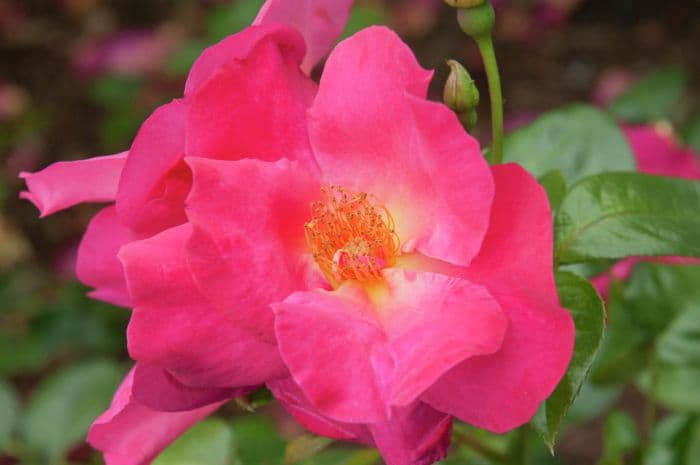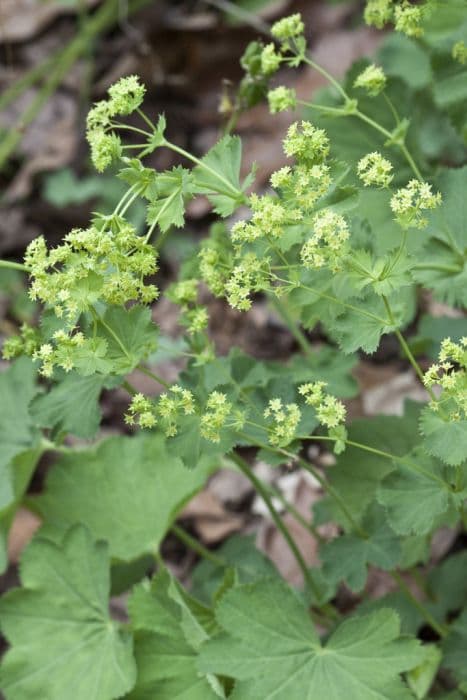Rose Rosa 'Jill Dando' (S)

ABOUT
Rosa 'Jill Dando' is a type of rosebush that produces attractive flowers recognized for their visual and aromatic qualities. This particular variety is known for its beautiful blooms, which display a soft apricot color that can sometimes exhibit hues ranging from a delicate peach to a creamy yellow, imbuing the petals with a warm and inviting appearance. The flowers typically possess a classic rose shape, with a high-centered and cupped form, inviting admiration for their traditional elegance. Each flower on this plant is composed of multiple layers of petals that are velvety in texture, contributing to the overall richness and depth of the bloom. The petals may show a gentle gradation of color, with the lighter tones typically concentrated near the center of the flower, deepening to the outer edges. The roses exude a delightful fragrance that is both sweet and subtle, with a pleasing scent that can attract passersby as well as various pollinators. The foliage of Rosa 'Jill Dando' is equally appealing, with glossy green leaves that provide a lush backdrop for the display of its stunning flowers. These leaves highlight the flowers further, contributing to the plant's ornamental value. The rosebush itself is typically characterized by an upright and bushy growth habit, supporting numerous flowering stems that help showcase the blooms in a clustered or solo presentation, which can make a striking statement in any garden setting. As a cultivated variety of rose, Rosa 'Jill Dando' is often appreciated for its contribution to landscape designs, whether as a standalone feature or when combined with other garden plants to create a tapestry of textures and colors.
About this plant
 Names
NamesSynonyms
Jill Dando Rose.
Common names
Rosa 'Jill Dando'
 Toxicity
ToxicityTo humans
The common name for Rosa 'Jill Dando' is rose. Roses are not considered toxic to humans. They do not typically pose any risk of poisoning if ingested in small quantities. However, the plant can have sharp thorns that may cause injury if handled without care. Eating large quantities of rose hips, the fruit of the rose plant, can potentially cause stomach upset due to the vitamin C and fiber content, but they are generally considered safe and edible when prepared properly.
To pets
The common name for Rosa 'Jill Dando' is rose. Roses are not considered toxic to pets such as dogs and cats. They are generally safe and do not cause poisoning when ingested. Nevertheless, the thorns on rose plants can cause physical injury to pets if they try to chew on the stems or foliage. It's important to keep an eye on pets around rose bushes to prevent any potential injuries from the thorns.
 Characteristics
CharacteristicsLife cycle
Perennials
Foliage type
Deciduous
Color of leaves
Green
Flower color
Pink
Height
3 feet [91 cm]
Spread
2 feet [61 cm]
Plant type
Shrub
Hardiness zones
6
Native area
Cultivar
Benefits
 General Benefits
General Benefits- Ornamental Value: Rosa 'Jill Dando' adds aesthetic beauty to gardens with its attractive pink blooms.
- Attracts Wildlife: This rose variety can attract pollinators such as bees and butterflies, which are beneficial for a healthy ecosystem.
- Perfume: The flowers may produce a pleasant fragrance, contributing to sensory garden experiences.
- Ease of Cultivation: Rosa 'Jill Dando' is known for being relatively easy to grow, requiring standard rose care.
- Long Blooming: It typically offers a generous flowering period, providing color for much of the growing season.
- Drought Tolerance: Once established, it may be more tolerant to dry conditions than some other garden plants.
- Seasonal Interest: Provides visual interest throughout the seasons, from leaf-burst in spring to autumnal color changes and sometimes attractive hips in winter.
- Emotional Significance: Roses often hold strong symbolic value and can carry personal or cultural significance, which can add emotional value to a garden setting.
- Hardiness: This plant is bred to withstand certain levels of cold and adverse weather, making it suitable for various climates.
- Versatility: Can be used in various landscaping applications, such as borders, rose gardens, or as a specimen plant.
- Plant Structure: Can provide structure and form to garden beds and landscaping designs.
 Medical Properties
Medical PropertiesThis plant is not used for medical purposes.
 Air-purifying Qualities
Air-purifying QualitiesThis plant is not specifically known for air purifying qualities.
 Other Uses
Other Uses- Crafting natural dyes: The petals of the rose can be used to create natural dyes for fabric or paper, providing a delicate pink or mauve hue depending on the concentration.
- Creating rose petal jam: The petals of the rose can be employed in making a sweet and fragrant rose petal jam, often used in Middle Eastern cuisine.
- Flavoring foods: The petals can be used to infuse sugars or to make rose-flavored desserts, such as ice cream or panna cotta.
- Aromatic bathing: Rose petals from this variety can be added to bathwater for a natural, soothing, and fragrant bathing experience.
- Bookmarks: Dried petals or entire flowers can be pressed and used as decorative bookmarks.
- Botanical art: The flowers and leaves can be pressed and used for botanical art, crafts, or herbarium specimen collections.
- Eco-friendly confetti: Dried petals can serve as biodegradable confetti for weddings or other celebrations.
- Candle making: Petals can be embedded into wax to create decorative and scented candles.
- Enhancing compost: Rose trimmings can be added to compost bins to help enrich the resulting compost with natural organic matter.
- Decoration: Fresh or dried roses can be used to adorn gift wrapping or to create table centerpieces for special occasions.
Interesting Facts
 Feng Shui
Feng ShuiThe rose is not used in Feng Shui practice.
 Zodiac Sign Compitability
Zodiac Sign CompitabilityThe rose is not used in astrology practice.
 Plant Symbolism
Plant Symbolism- Love: Roses are universally recognized as a symbol of love and affection. Given as a gift, they can express deep romantic feelings.
- Beauty: The 'Jill Dando' rose, like many roses, is often associated with beauty both for its visual appeal and its fragrant scent.
- Honor: Roses can symbolize honor and homage, often used to pay tribute to someone's achievements or memory.
- Devotion: This plant signifies deep devotion and loyalty, reflecting an enduring emotional bond or commitment.
- New Beginnings: A rose can also represent fresh starts and hope, commonly given to celebrate new endeavors.
- Sorrow: Despite their beauty, roses can express condolence and sorrow, making them appropriate for sympathy gatherings.
 Water
WaterThe Rose 'Jill Dando', commonly known as simply a rose, benefits from deep, infrequent watering to promote strong root growth. Depending on the climate, soil type, and weather conditions, watering is typically needed once a week during the growing season. Provide the rose with 1 to 2 gallons of water per plant each time, ensuring that the water penetrates the soil deeply rather than just wetting the surface. During periods of drought or extreme heat, the frequency may need to be increased. In winter or when rainfall is sufficient, reduce or eliminate watering to prevent excess moisture and potential root rot.
 Light
LightRoses thrive in full sun, meaning that the Rose 'Jill Dando' should ideally receive at least six hours of direct sunlight each day. The best spot for the plant would be in a garden area that is exposed to direct sun for most of the day without tall trees or structures casting shadows on it. Avoid placing them in heavily shaded areas as this will impede their growth and flowering capability.
 Temperature
TemperatureThe Rose 'Jill Dando' prefers temperate climates and is hardy in a range that typically falls between 20°F and 90°F. They generally do best when daytime temperatures are between 65°F and 75°F. It's important to protect roses from harsh winter conditions with mulch or coverings if temperatures are expected to fall below the hardiness threshold.
 Pruning
PruningPruning Rose 'Jill Dando' encourages healthy growth, improves air circulation, and increases flower production. Prune in the late winter or early spring, removing dead or damaged wood, and shape the plant to allow sunlight to reach the center. Cut back the remaining canes by about one-third to one-half to promote vigorous new growth. Deadheading, or removing spent blooms during the growing season, encourages more blooms.
 Cleaning
CleaningAs needed
 Soil
SoilRoses, including the Jill Dando rose, thrive best in loamy, well-draining soil with a soil pH of 6.0 to 6.5. For optimal growth, mix equal parts garden soil, compost, and peat or pine bark for aeration. This mixture ensures good drainage while retaining adequate moisture and nutrients.
 Repotting
RepottingRoses like the Jill Dando variety are typically planted outdoors and do not require repotting. If grown in containers, repotting every 2 to 3 years is sufficient to refresh the soil and provide space for root growth.
 Humidity & Misting
Humidity & MistingRoses, such as the Jill Dando rose, prefer average outdoor humidity levels between 40% to 70%. They can tolerate a range of humidity conditions but it's important to ensure good air circulation to prevent fungal diseases.
 Suitable locations
Suitable locationsIndoor
Provide bright, indirect light and good air flow.
Outdoor
Plant in full sun with fertile, well-draining soil.
Hardiness zone
5-9 USDA
 Life cycle
Life cycleJill Dando Rose begins its life cycle as a dormant grafted plant or bare-root, typically planted in early spring or late autumn. Upon establishment, the plant enters a vigorous vegetative state, producing lush foliage and stems in preparation for flowering. Flowering occurs in late spring to early summer, showcasing its cream or apricot-colored blooms which are often fragrant. After pollination, some roses may produce hips (fruit), which contain seeds that can lead to the propagation of new plants if allowed to mature and are properly planted. Throughout the growing season, the rose will go through cycles of growth and bloom, often requiring pruning to maintain shape and health and to encourage further flowering. As temperatures decrease in the fall, the rose gradually becomes dormant, conserving energy for the next growing season.
 Propogation
PropogationPropogation time
Spring-Early Summer
Propogation: Rosa 'Jill Dando', also known as a hybrid tea rose, can most effectively be propagated through the method of semi-hardwood cuttings. The ideal time to propagate these roses is usually late summer or early fall, when the new growth has begun to mature and harden slightly. To propagate, select a healthy non-flowering stem from the current year's growth. Cut a section of stem about 6 to 8 inches (15-20 cm) long, making sure it has at least a couple of sets of leaves. The cut should be made just below a leaf node, as this is where the hormones that stimulate root growth are most concentrated. Dip the cut end into a rooting hormone to encourage root development and plant into a pot filled with a well-draining soil mix. Make sure to keep the soil moist but not waterlogged and provide a humid environment by covering the cutting with a plastic bag or placing it in a propagator. With proper care, the cutting will develop roots within several weeks and can eventually be transplanted into the garden.









